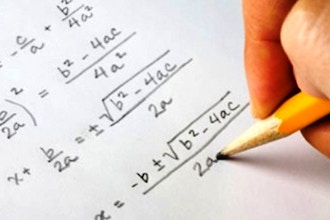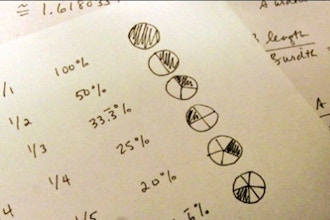Math Lessons
NYC
Learn everything from basic arithmetic to advanced calculus in these NYC math classes, where participants can sharpen their problem-solving skills and gain a solid foundation in mathematical concepts.
Unfortunately, no classes have spots left
Chekhov's Gum Presents: Crap Ballet
Caveat @ 21-A Clinton St, New York, NY
Justin Silver may not look like a dancer, but he’ll pirouette into your heart and peer into your pocketbook in this Fringe preview! When a sleazy venture capitalist gets his hands on a failing ballet theater in New Mexico, his plans to bring it back from bankruptcy stop short when he comes to a terrible realization: he knows absolutely nothing about dance. With no cast, a staff of idiots, and a body past its prime, he sets out to become the world’s...
Saturday Math: Algebraic Thinking (continued)
Continuing Professional Studies at Bank @ 610 W 112th St, New York, NY
Welcome to Saturday Math, a place where teachers, administrators, curriculum enthusiasts, and other colleagues do, learn, and talk about math together. Five times each year, we meet to explore our own mathematical thinking and discuss issues related to teaching and learning mathematics. Each facilitated session consists of interactive activities and discussions, and you will go home with resources and ideas to try out in your own practice on Monday....
Saturday Math-Finding the Joy in Teaching Math
Continuing Professional Studies at Bank @ 610 W 112th St, New York, NY
Join educators, administrators, and curriculum enthusiasts at Continuing Professional Studies at Bank for an interactive and collaborative exploration of mathematical thinking and teaching strategies. Discover new resources and ideas to enhance your practice in this engaging professional development opportunity.

Math Classes Gift Card
Thousands of classes & experiences. No expiration. Gift an experience this holiday season and make it a memorable one. Lock in a price with the Inflation Buster Gift Card Price Adjuster™
Summer STEAM Program
NYC Makery @ 131 8th St, Brooklyn, NY
STEAM = Science, Technology, Engineering, Art & Math Experience our STEAM* tasting menu for hungry brains through Coding, Design-Thinking, 3D Printing, Inventing DIY Bots, and Fabricating Creative Machines during our week long summer program. We’re creating a special set of daily fun maker adventures. Monday: Creative Coding Explore the possibilities in creative programming. We kickoff with a physical activity to explore and embody...
Algebra: Rules and Symbols
Brooklyn Institute for Social Research
What is algebra? This question is not as simple as it seems. In this course, we will explore the meaning and extraordinary mathematical power of algebra through a study of its historical development. We’ll begin with so-called classical algebra—or the invented use of letter symbols (variables) to represent numbers and the rules for their manipulation. Using variables led to the key concepts such as polynomials and a focus on solving equations–a...
Basic Math Refresher
New York City College of Technology @ 25 Chapel St, Brooklyn, NY
This course has two components. First, it is a basic refresher of pre-algebra and simple algebra for individuals in any field. Second, it caters the math for the preferred career path that you plan to pursue, from health and hospital-related activities to budgeting finances and accounting.
Girls Make STEAM!
NYC Makery @ 1 Jay St, New York, NY
STEAM = science, technology, engineering, art & math A special 3 Day Series for some girl power time. Our theme will be crafting and coding artful gadgets. Everyday we will be offering a different creative project workshop. Wednesday: DIY Technology: From bat signal headbands to flashlight barrettes or massaging scarves, we’ll pose questions around the future of fashion accessories and prosthetics while challenging you to explore making...
Family Circuits: A workshop for Parents & Kids
Together we can build a fairy godmotor! Parents & guardians, register with your kids for a playful, hands-on creature building workshop exploring motors and kinetic movement. Experiment with how to architect a creature that flutters or chimes bells. Family teams make discoveries while creating together! No prior experience necessary, designed for youth ages 7-9 and their parents. Take home what you make. Note: Students...
Algebra 1
Has it been years since you last studied math, but now you find yourself having to get up to speed in order to gain admission to a college program, place into a college course, or qualify for a job? Whatever your reason, this math series can help fill in the blanks of your knowledge of important math topics covered in pre-algebra and algebra 1 courses, and on tests. There are no prerequisites for either course, but if you aren't sure whether...
Pre-Algebra
Has it been years since you last studied math, but now you find yourself having to get up to speed in order to gain admission to a college program, place into a college course, or qualify for a job? Whatever your reason, this math series can help fill in the blanks of your knowledge of important math topics covered in pre-algebra and algebra 1 courses, and on tests. There are no prerequisites for either course, but if you aren’t sure whether...
Math Lessons in NYC are rated 4.1 stars based on 179 verified reviews from actual CourseHorse.com purchasers.
-
Price Lock Guarantee
Secure your booking now and we'll match any price drop within 48 hours across all booking platforms, ensuring you never miss out on savings!
-
Earn 10% Reward Points
Maximize your savings with every purchase. Unlock rewards on every transaction, ensuring you get the most value out of your experience!
-
No Added Fees
Enjoy hassle-free transactions without worrying about additional charges. With us, what you see is what you pay - no surprises!
-
Curated Courses
Discover a curated selection of courses handpicked by experts in the field. Dive into quality content that suits your learning needs and interests!


















